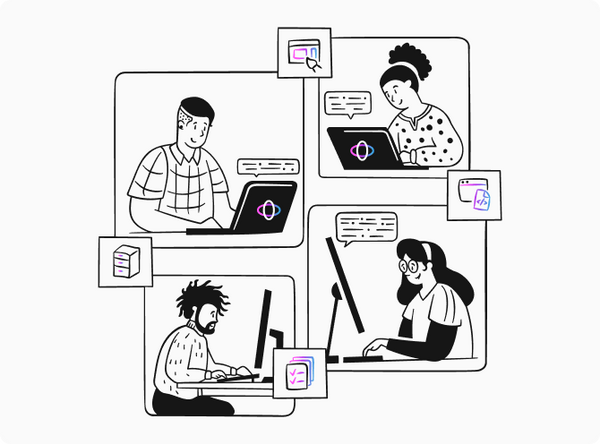
Starting a business is a risky and expensive venture. Building a fully-fledged app can easily go over $100,000, depending on the complexity of the interface and features added. For this reason, it’s highly recommended that companies first test their business ideas with a Minimum Viable Product (MVP). In this post, we’ll cover the benefits of a minimal valuable product in detail so you can better understand why you need it and use your resources wisely. Read on to find out more about the benefits of MVP for startups.
Advantages of an MVP Development: What Are They
MVP development is a starting point that many startups use to test their business concepts. Even some of the biggest companies like Facebook, Airbnb, Uber, and Spotify started out with a minimal viable product to validate their business assumptions and scale up to the apps we know today.
Do all companies need an MVP, though? We’d certainly answer “yes” to that. Whether you’re a startup or a large IT company, building an MVP can help you save a lot of development hours and craft a product that will meet the targeted audience’s needs.
So What Are the Benefits of MVP Model
One of the biggest advantages of MVP development is that it allows entrepreneurs to test business concepts and reduce the risks of failure. Did you know that the main reason over 35% of startups fail is due to a lack of understanding of market demand? With an MVP, however, companies run minimal risks, as they get the opportunity to verify if there is a demand for a product at an early stage.
Aside from that, an MVP allows companies to make better business decisions. Instead of investing in non-essential features, they can start with a simple iteration of a product and, based on user testing data, improve their offering. However, this is only the tip of the iceberg when it comes to MVP benefits. To get a bigger picture of what MVP advantages your business can get, let’s dive into the details.
Helps to Validate Business Idea
Companies often assume that the products they create will help meet specific user needs. However, this is not always the case. Users’ needs change at an ever-increasing rate, making it quite difficult to predict whether they will like a product or not.
With an MVP, though, you can pinpoint exactly what people are interested in. This, in turn, can help you focus on the vital features rather than investing money in redundant functionality.
Sometimes, it may be necessary to change the whole business concept if you see there’s no market demand. For example, Instagram, which started out by the name Burbn — an app that allowed people to check in particular locations and upload photos from there — was completely transformed when its founders realized that people were most interested in sharing photos rather than mapping their locations. The same may happen to your business idea.
Good for Testing Market Demand
As mentioned earlier, creating an MVP allows companies to verify market demand. A quick release of a barebone version of your product can help determine if potential users will use it or not, thus avoiding costly mistakes. In addition, it can give you an idea of the features that should be implemented to add to the offer value.
Saves Time and Money
Another common reason startups fail is that they run out of money before the product is ready for release. This often happens because companies plan for what they’ll do when they get the next funding rather than make plans based on what they already have. Besides, a lot of businesses try to cover much more complex functionality than they actually need, resulting in a quick burn of the budget.
One of the advantages of an MVP for a startup is that it helps minimize these risks. Not only is building an MVP a lot cheaper than a large-scale product, but also it takes considerably less time. As a result, you can quickly gather customer insights and decide on the features that are best to invest in in the first place.
Provides You With a User Feedback
One of the other important benefits of an MVP is that it allows you to research your target audience and gather immediate feedback from real users. Thanks to this, you get the opportunity to quickly validate your business assumptions and tailor the functionality of the product, focusing on the aspects that have the biggest impact.
In the case of Dropbox, for example, they didn’t even have to develop a physical MVP. It was enough to create a short demo video that explained the core principles of file sharing through Dropbox to get from 5,000 up to 75,000 subscribers overnight.
Good for Attracting Investors
Many startups rely on funding from investors and stakeholders to get the ball rolling. The key is to convince investors that the product you’re pitching has a demand and is worth investing in. That’s where the benefits of an MVP for startups shine the brightest.
With a minimal viable product, you can kill two birds with one stone. You get to test the market validity of your product and create a solid case to show to investors to secure buy-in.
Allows for a Quick Launch
The release of an MVP is a surefire way to speed up the release of the final product. After you get the first feedback on the initial version of a product, you will better understand which features are of paramount importance and should be further developed and which functionalities can be abandoned. More importantly, you will get ahead of competitors who might be planning to release an app similar to yours.
…And Scale Safely
Without a doubt, one of the biggest benefits of building an MVP is that it allows companies to start smaller and scale up, spreading out the cost. As a result, not only can they avoid wasting money fixing bugs but also make sure that the budget goes to significant features. Thus, allowing them to slowly and steadily bring the product to perfection.

Advantages of Hiring a Professional Development Team for Creating an MVP
Perhaps, the main reason startups manage to get their mobile projects off the ground successfully is that they hire a professional development team rather than rely on their gut feeling. Thanks to this, they have confidence that their goals are met, and the budget is allocated rationally. However, these aren’t the only advantages. Other benefits of developing an MVP with the help of a professional team are listed below.
Best for Startups
One thing that professional development teams have and startups lack is experience. Developers not only have the knowledge of building an MVP, but they can also “look into the future”, allowing business owners to avoid situations where they run out of money before the product is ready to be released. Thanks to this, startups can be sure that the MVP will be professionally built and flexible enough to make any changes.
No Hiring Chaos
It may be cheaper to bring in freelance developers to build an MVP, but only in the early stages. In reality, once you go ahead with your project and decide to include or exclude certain features, you might be unpleasantly surprised how dearly it will cost you to bring those changes to life, not to mention the chaos that hiring new people involves.
With a professional development team, however, this won’t be an issue. Since they are in charge of your project from start to finish, they’ll make sure the product can be easily adjusted to meet customers’ changing needs and the spending is within the limit.
Cost-Effectiveness
Hiring a professional team of developers may seem expensive, but, in fact, quite the opposite is true. If you hire an outsourcing company, you can save a lot of money that you would have to spend on managing an in-house team, including tax payments, utilities, and so on.
On top of that, a professional approach to an MVP can help plan the goals of each development stage ahead, thereby preventing unexpected costs. So, eventually, while it might seem costly at first, hiring a professional development team will allow you to save money in the long run.
Gives Access to Domain Expertise
Startups often come up with great ideas but, unfortunately, not all of them have the knowledge of the essential aspects of developing an MVP, which may lead to failure. Professional developers, however, are trained to recognize the essentials. As a result, they can help you set more accurate objectives and get you to the market in a shorter space of time without draining a hole in your wallet.
Lower Risks
Developing a large-scale mobile project always involves risk, especially for startups working on a tight budget. Even an MVP can be quite expensive if not approached in a professional way. However, these risks can be avoided if you hire a professional team of developers. With their knowledge and expertise in the field, it will be easier to pinpoint the features that are worth investing in and minimize a lot of costly errors.
Product Maintenance and Support
An MVP is only the first stage of product development. You will need to maintain it and scale it up until it shapes into the full-scale project that you meant it to be. That’s where the help of developers is invaluable. Not only will the development team support your product from start to finish, but it will also increase the chances of getting positive feedback from the target audience by constantly updating the MVP.
Ongoing Guidance
You never know what might happen when you launch an MVP to market. Even when you have all the signs that your product should be a success, life happens. Customer needs may change, new technologies emerge, and all of this may lead to the need to make changes to your product. When you have a reliable team of developers, however, you can quickly respond to those needs and get the desired features implemented.
You yourself may want to follow in the footsteps of companies like Instagram and completely change your business concept. With a dedicated team well-versed in all phases of the development process, you can do it much faster and cheaper than doing everything from scratch.

Consider Lunka.tech Your Trusted Partner
If you’re on the lookout for a reliable outsourcing company to develop an MVP, you’ve come to the right place. Lunka.tech has over 5 years of experience helping businesses develop MVPs, backed by a long record of positive reviews. We also take pride in our talented team of developers made up of highly-skilled specialists well versed in the latest technologies, including Swift, Python, Firebase, Django, etc., allowing us to tackle all kinds of projects.
To learn more about our MVP app development company and how we can help, be sure to check our portfolio. If you have any questions about how to launch your product, how long the development process will take, and how much it will cost, don’t hesitate to contact us — we’ll get back to you shortly.

Final Thoughts
To wrap up, building an MVP is beneficial for both startups and large IT companies. That said, it’s only beneficial as long as you know what you’re doing. So you basically have two options: either to rely on your gut feeling, or hire a professional team of developers who can help you build an MVP with product clarity, cost-efficiency, and scalability in mind. If the latter seems more reasonable to you, make sure to get in touch with the Lunka.tech team and we’ll help you get started.
FAQ
What are the benefits of an MVP model?
There are many benefits of a minimum viable product. First of all, developing an MVP allows you to test the reaction of customers to the product and gauge the market demand. Secondly, once you measure the results, you can separate the important features from those that aren’t necessary. Most importantly, creating an MVP allows you to keep the development costs low as you implement the desired features, keeping product functionality down to essentials.
What are the advantages of an MVP for startups?
The biggest advantage of an MVP for a startup is that it allows you to keep the development costs down while giving you the chance to validate the market demand for a product.
How long does it take to build an MVP?
It depends on the product, but in general, an app with a basic interface and a set of features can be launched to the market in 2-4 months.
How can I make my MVP successful?
There’s no formula for making an MVP successful, but you can definitely get close to it if you enlist the help of professionals. With a professional team of developers, you’ll be able to avoid many mistakes that can cost you thousands of dollars. Plus, your MVP will have all the essential features that your customers need to interact with the app. All of this will let you gather customer insights and make informed decisions for future upgrades.


